Customer Information Document:
We are proud of our long history of safe, enjoyable educational visits. The enthusiasm, and commitment of our staff in working to our systems and procedures is just one way that our staff ensure a positive experience for our customers.
This page includes our codes of practice and policies that underpin our commitment to the safety and wellbeing of our customers and our staff. We have an extensive Operational Codes of Practice (OCoPs) that support our staff in greater depth through appropriate training which forms the basis of our operations.
We maintain systems and procedures to:
- Clearly establish the standards to which our centres operate.
- Ensure consistency across the centres, whilst recognising centre needs.
- Ensure we meet our legal requirements and sector best practice.
- Meet customer expectations.
- Demonstrate our commitment to safety to our customers, other interested parties, local authorities and governing bodies including HSE, AALS and LOtC.
- Demonstrate our values and commitment to minimising our environmental footprint.
Definitions can be found in the Field Studies Council Terms and Conditions, including:
- Room Hire Booking
- Centre Hire Booking
- Group Booking
- Individual Booking
- Centre
- Course
- Customer
- Group Leader(s)
- Participant(s)
Health and Safety
We prioritise the health and safety of all visitors and aim to function in a safe and secure manner so that visitors can focus on fully immersing themselves into the environment and their chosen activity. With 80 years of experience we have been able to establish effective policies in all areas where sensible care and attention is required, and these policies are reviewed continuously. We promote a risk benefit approach to learning outdoors.
We comply with all relevant regulations including:
- Health and Safety at Work Act 1974
- Health and Safety (First Aid) Regulations 1981
- Activity Centres (Young Persons’ Safety) Act 1995
- Reporting of Injuries, Diseases and Dangerous Occurrences Regulations 2013
- Management of Health and Safety at Work Regulations 1999
- Safeguarding Vulnerable Groups Act 2006
Our systems are aimed at providing an appropriate level of support to Group Leaders during their visit to a Field Studies Council Centre whilst fulfilling oue own Duty of Care as a provider. Group Leaders, in exercising their duty of care, remain responsible for the overall safety of their participants at all times, other than whilst undertaking a technical activity e.g. rock climbing, where a higher level of care is transferred to the technical specialist.
Our policy is that safe and productive out-of-classroom activities must be based upon a partnership between the provider, organisers and participants. We also hope that organisers and accompanying staff will participate as fully as possible in the planning, support and follow up of the course to ensure that its educational potential is fully realised.
Teachers and other staff in charge of young people have a common law duty to act as any reasonably prudent parent would do in the same circumstances.
(Ref Health and Safety: Advice for Schools DFE-00035-2014)
Supporting Group Leaders
We ask for the support of group leader(s) in contributing to the health and safety of everyone during their visit. We want to help you to ensure the whole visit is as successful as possible.
To ensure this we provide:
- Staff with the necessary training, qualifications and experience to work safely and effectively with your group.
- The opportunity to carry out a pre-visit to one of our centres (*Group Bookings only).
- Clear guidance on the responsibilities of us, of group leaders and of participants with regard to safety, supervision and welfare.
- A behaviour code of conduct we ask all our visitors to adhere to (Appendix 1.3).
- Opportunities for group leaders to liaise with staff in advance of their visit.
- Staff who will support your group throughout their stay.
- Public Liability Insurance for £20 million and Employers Liability cover for £10 million.
Group Leaders Responsibilities
Group Leaders (*Group Bookings only) are responsible for the following:
- Risk Assessing the journey to and from the Centre.
- Ensuring any activities not led by FSC staff, including non-contact time, are appropriately Risk Assessed.
- Having a presence on site and during activities to ensure the appropriate behaviour and remain responsible for the behaviour of their participants at all times.
- Have adequate and effective arrangements for the pastoral care of their participants during non-contact time including managing incidents out of hours and overnight to ensure the safety of all their participants.
- Ensuring accompanying adults are suitably competent and coordinating their positive involvement during the educational visit.
- Holding, or have access to, out of hours contact numbers for their organisation. They should also have a list of contact numbers for the next of kin of participants.
- Ensuring that they are able to meet the requirements of their organisations safeguarding policies.
Group Leaders are also responsible for the following:
- Ensuring that FSC is made aware of any participants mobility, medical, dietary or health issues, individual or special educational needs in sufficient time, prior to the course.
- Ensuring that in the event of illness or indiscipline the organisation or parent/guardian have arrangements in place to facilitate the safe return home of the participant(s).
Participant Responsibilities
Participants on courses at Field Studies Council Centres also have responsibilities:
- All participants must follow Health and Safety instructions.
- All participants should behave with a concern for the safety of themselves and others and follow the Field Studies Council behaviour code (Appendix 1.3) and other Field Studies Council policies including Appendix 1.1.
- All participants (or their parents/guardians) should ensure that Group Leaders are made aware of any health, dietary or medical conditions prior to the course.
- All participants must be aware that they may be required to return home at their own expense, and at the earliest practicable opportunity, if they do not fulfil these responsibilities.
- All participants should ensure they have adequate amounts of medication with them at all times. This may be more than you usually carry as you could be in more remote areas with limited and/or delayed access to medical treatment. Examples may be inhalers and adrenaline auto-injector (AAI) devices.
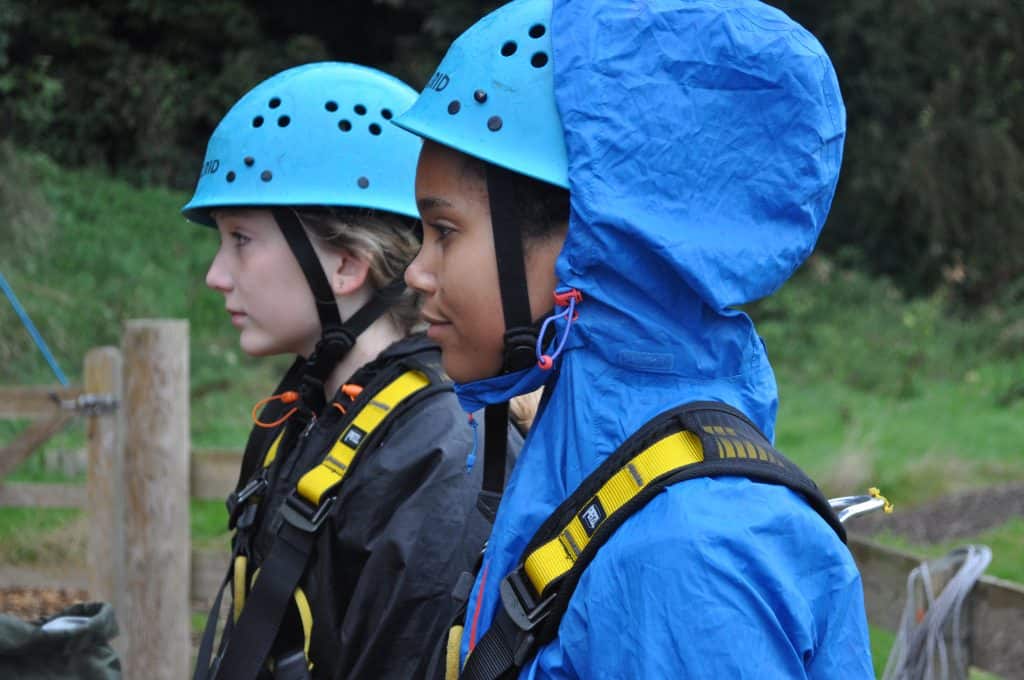
Risk-Benefit Approach
We support the risk-benefit approach to risk assessment for our outdoor activities that has been adopted by both HSE and RoSPA. The benefit of taking acceptable intellectual and physical risks can be seen in the growth and development of young people.
We are committed to the delivery of High Quality Outdoor Learning and we appreciate and assess the risks associated with delivering over 3 million learner hours of outdoor learning every year. A detailed risk assessment for activities and teaching sites is undertaken which forms the basis of a dynamic approach to assessment by trained staff whilst in the field.
We know that we cannot remove all risk so we adopt control measures to mitigate risks to an acceptable level. Remaining risk is weighed against the academic and personal benefit of undertaking the activity whether it be a formal education programme, adventurous activity or informal learning and outdoor play.
We support the OEAP National Guidance for the management of Outdoor Learning and have aligned our internal processes and procedures to be consistent with this where applicable.
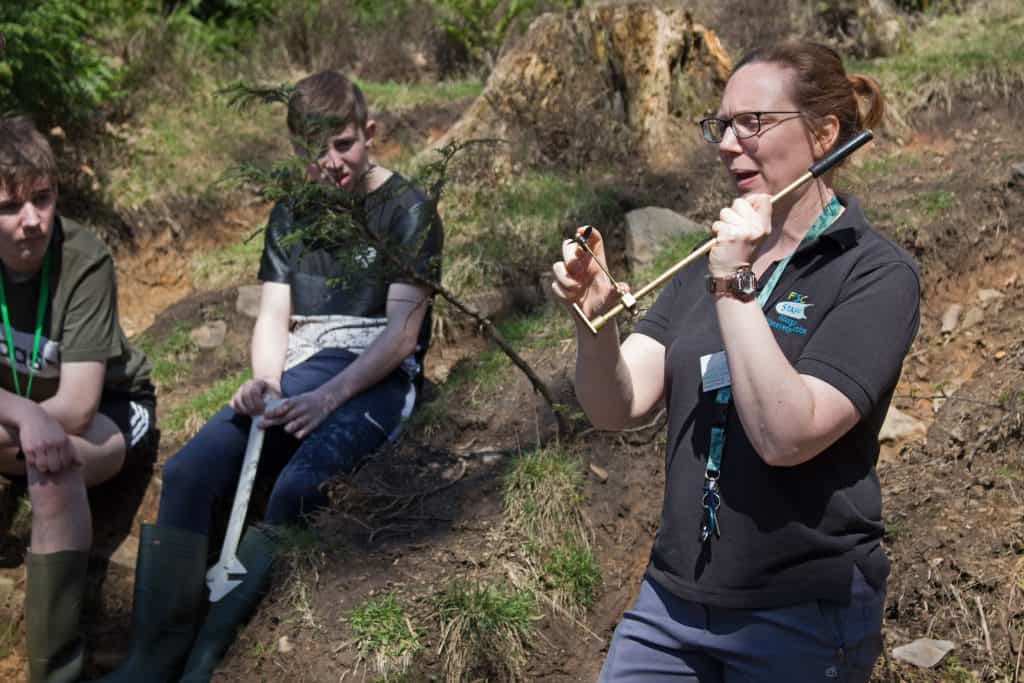
Our Staff
Our staff are committed to providing enjoyable, first hand experiences at our centres. Many are full time staff, that work for us all year round and all staff have a thorough knowledge of our systems and procedures.
When staff are recruited, they go through a formal application, selection and interview process. Any existing qualifications are backed up with documentary evidence. Appointed staff undergo an induction process and a probationary period. Staff in England, Wales and Northern Ireland are required to undergo a satisfactory enhanced check as appropriate to the role with the Disclosure & Barring Service or Access NI and in Scotland staff are subject to Disclosure Scotland’s PVG Enhanced Disclosures. This process is repeated on a 3 year cycle. All our staff are issued with an employment contract, which is supported by an staff handbook and a health and safety handbook.
All our staff also undertake a national and centre induction and relevant training, including externally accredited courses in safeguarding. The exact training will depend on their role, their past experience and the needs of that centre, and includes centre-specific training, organisation-wide training and/or certified external training. Before teaching, staff are assessed as competent, by experienced senior staff. Throughout their career, staff are supported by peer mentoring, observations, feedback and reviews.
We comply with relevant industry standards when delivering activities and is supported by appropriate experienced Technical Advisors who are technically qualified to advise on the safe conduct of that activity, in that location.
External Badging
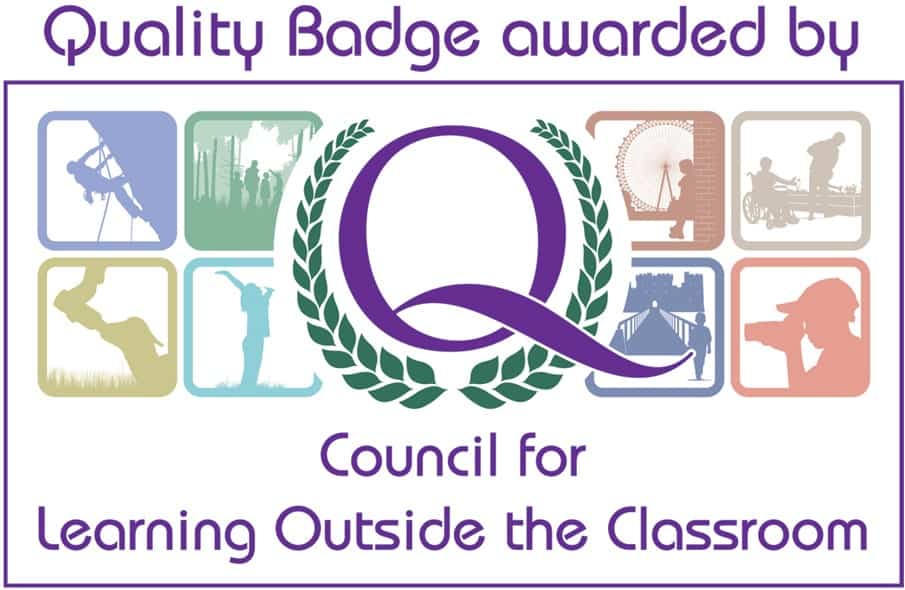
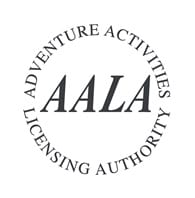
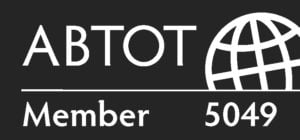
Learning Outside the Classroom Quality Badge
All of our centres have been awarded the Quality Badge by the Council for Learning Outside the Classroom for school groups. Each Centre achieved the badge by demonstrating that they consistently deliver high quality teaching and learning experiences to school groups and manage risk effectively. This means that you do not have to assess them and therefore have to complete less paperwork for your local authority. All location certificates can be found here.
AALA
Some of our Centres provide adventurous activities and are inspected and licenced by AALA. The following Centres are AALA Licenced:
- FSC Blencathra (Gorge Scrambling, Hill Walking & Mountaineering (summer))
- FSC Castle Head (Abseiling, Gorge Scrambling, Hill Walking & Mountaineering, Improvised Rafting, Mine Exploration, Open Canoeing, Rock Climbing, Sea Level Traversing)
- FSC Millport (Improvised Rafting (summer), Rock Climbing)
- FSC Rhyd-y-Creuau (Abseil, Gorge Scrambling, Hill Walking & Mountaineering (summer), Mine Exploration, Rock Climbing (single pitch)).
You can see details on the AALA website.
External Providers
We use external providers to deliver some activities. These will often involve sites, equipment or technical expertise not available within a centre. Where a centre uses a third party (external) contractor, as part of an organised programme or course, we will require the external provider to hold the Learning Outside the Classroom (LOtC) Quality Badge and relevant NGB qualifications as appropriate.
ABTOT Financial Protection
We provide financial security for all bookings by way of a bond held by the Association of Bonded Travel Organisers Trust Limited (ABTOT), member number 5049, 7th Floor, 69 Leadenhall Street, London, EC3A 2BG. (www.abtot.com). ABTOT cover provides for a refund in the event that FSC ceases trading and you have not yet travelled or repatriation if you are abroad. Please note that bookings made outside the EEA are only protected by ABTOT when purchased directly with FSC. In the unlikely event that you require assistance whilst abroad due to our financial failure, please call our 24/7 helpline on 01702 811 397 and advise you are a customer of an ABTOT protected travel company.
Our Systems
To support our customers, we will ensure the following:
Medical and Dietary Requirements
FSC continually works to enable all participants to enjoy the benefits of our courses. We require medical, SEND and dietary requirements for all participants in advance of your stay. A form will be provided by the Centre for you to return in advance of your visit.
To ensure we can cater for additional needs of an individual, we require advanced notice, to enable us to assess options, agree actions and plan
our course. You must highlight where we may need to adjust, alter or adapt our
programmes to cater for individual needs and discuss this with us. We are only able to take responsibility for arrangements that have been discussed, agreed and confirmed in writing, with us in advance.
We can cater for most special diets as specified by culture, religion and medical concerns including allergies and intolerances providing we have adequate notice.
Risk Assessments
All FSC Centres, sites for fieldwork and activities led by FSC will be comprehensively risk assessed with the significant findings documented and acted upon. FSC Tutors will be capable of carrying out ongoing risk assessments at field sites and amending the fieldwork or activities if required due to group, weather or other circumstances.
The risk assessment summaries are generated from the formal risk assessment programme carried out by the senior management at each centre. All of our risk assessments are moderated centrally, to ensure continuity and consistency in approach.
Child Protection and Safeguarding
FSC has a safeguarding policy (FSC OCoP) that all staff are aware of and outlines the procedures they should carry out in the event they suspect a child or young person may be at risk of harm. FSC staff undertake training in safeguarding and we have designated safeguarding officers.
FSC staff will be subject to a Disclosure and Barring Service (or devolved nation equivalent) check at an appropriate level for their post. Safeguarding of visitors is a priority for the FSC and is delivered through induction, training and codes of practice.
First Aid
FSC undertake a first aid needs assessment to ensure adequate and appropriate equipment, facilities, and personnel to ensure employees and visitors can receive immediate attention if they are injured or taken ill. Our staff undertake appropriate first aid training for their role and to ensure first aid cover at all times.
FSC will ensure appropriate first aid cover for visitors during their stay. Where visitors require medical attention, beyond immediate first aid, Centre staff will support Group Leaders to make appropriate arrangements.
Catering
FSC catering operations are inspected by Local Authority Environmental Health Officers in the UK and graded against the National Food Hygiene Ranking Scheme.
FSC strives to provide healthy meals that demonstrate FSC’s values, reflecting the location, season and dietary requirements of visitors.
Equality and Access
We will support participants’ requests to opt out of our courses on religious grounds e.g. to pray or another purpose confirmed by the Group Leader. With advance notice, the programme can be modified to account for these needs. If your group is fasting, please advise us as soon as possible if special arrangements need to be made e.g. changes in meal times, prayer times, and changes to or alternate activities to account for possible fatigue.
For some activities wearing a helmet is required, and the participant must choose to wear the helmet, or not participate. If the helmet can be worn over the headgear, still perform its function and does not change the shape of the head, create lumps or irregular pressure points, then this is permitted. If this cannot be achieved and the participant wants to participate, private space can be provided for participants to remove headgear and replace this with the helmet. Fitting will need to be checked by the instructor before participation.
We will assist participants with cultural needs e.g. dress code, or domestic arrangements, where the adjustments are reasonably practical, and do not represent a health and safety risk.
Transport
All FSC vehicles are well maintained and their journeys Risk Assessed. Where FSC hires vehicles, e.g. coaches to transport participants whilst at the Centre, FSC will ensure that only reputable companies are used.
Outdoor Diseases
Working in the natural environment in the UK exposes staff and customers to a wide variety of known outdoor diseases. Appropriate precautions and control measures should ensure that the risk of becoming ill is reduced to at least that of any other recreational visitor to the countryside. Any seasonal, or location specific information, will be provided by the Centre you are visiting.
Novel Coronavirus
FSC centres are operating as usual and we will continue to follow the advice of the UK government.
The safety of our staff, visitors and the wider community is our first concern.
We want to reassure all our customers that FSC already has very robust, detailed procedures in place for preventing the spread of illness and dealing with any outbreak at our centres.
Appropriate measures are already in place at our centres. We will be advising both staff and visitors to follow the most up to date guidance.
The latest advice from the UK government is updated at 2pm every day and can be found here.
If the situation changes in a way which will impact our approach, we will inform staff and customers as soon as possible through the FSC website and other appropriate media channels.
Emergency Procedures
At all times that visitors are on site there is a member of staff available to support them and respond to emergencies (Duty & On-Call system). All centres have accident and emergency procedures that are supported by the senior leadership team. FSC has a procedure for recording accidents and incidents.
Fire
A fire safety code of practice and risk assessment is in place at all centres, this is undertaken regularly by an external consultant with relevant expertise to ensure full compliance with the Regulatory Reform (Fire Safety) Order 2005 and Fire Safety (Scotland) Regulations 2005. The Management teams review the fire risk assessments twice a year and carry out any required works in an appropriate timescale. Centres ensure that appropriate signage is in place, equipment including alarms, and extinguishers are in place and testing regimes are undertaken at appropriate intervals. They also ensure appropriate staff training.
Some participants may need to complete a Personal Emergency Evacuation Plan (PEEP) a bespoke ‘escape plan’ for individuals who may not be able to reach an ultimate place of safety unaided or within a satisfactory period of time in the event of any emergency. PEEPs may be required for staff and visitors with: Mobility impairments, Sight impairments, Hearing impairments, Cognitive impairments, Other circumstances including short term injuries, pregnancy, or a medical condition. You must inform us via the dietary/medical information provided pre visit, if you think a member of your group requires a PEEP.
Security
FSC take the safety and security of all visitors and staff at our centres seriously. Procedures vary by Centre, and may include:
- Uniforms and Identification badges for staff and volunteers.
- Visitor badges and a signing in /out process.
- CCTV.
- Appropriate access restrictions, e.g. keypad access to buildings and / or rooms.
Valuables
Please be aware that if you bring valuable items e.g. mobile phones, tablets or jewellery this is at your own risk. FSC accepts no responsibility for damage or loss.
Participants are expected to comply with their own organisation’s mobile phone acceptable use policy and ensure that their phones are silent and out of sight during taught sessions, unless being used as part of the learning activity.
Please note the Centre cannot accept responsibility for loss or damage to, personal property. FSC also cannot accept responsibility for personal injury not arising as a result of its own action or default.
Photographs and Videos
We understand that you will want to take and share photos and videos whilst you are at the Centre. Please help us by making sure the use of devices does not distract from the safe running of the activity.You may also want to take photos in and around the Centres.
- Ensure you have the permission of any individual or group in shot.
- Avoid taking photos or video in proximity to accommodation, or bathroom facilities.
- Be aware of other users of the site and any rules they may have
Image Consent
Images of Young People: FSC Consent Form
FSC may take photographs or film at events and courses we run or have a presence at. By attending you give us permission to use any general crowd photos you appear in on our website, social media, printed literature or for any other marketing purposes. For photographs or videos of under 18’s who can be identified, we will ask for the consent of the parent/guardian, teacher or group leader with a written form before using them. If you are over 18 and do not want your image to be used please make a member of FSC staff aware.
Smoking and Vaping
FSC Centres are all non-smoking. Smoking and/or vaping is not permitted in the bedrooms, dining rooms, public rooms or minibuses. If you do need to smoke or vape please ask the Head of Centre for directions to the designated smoking location or an area where you can vape. Please refrain from smoking or vaping in front of younger guests.
Drugs and Alcohol
The term ‘drug’ has been used in this policy to include all drugs and substances, legal or illegal, which could adversely affect behaviour or performance, and which can lead to an increased risk of accidents and/or injuries occurring whilst staying at an FSC Centre or engaging in fieldwork. This policy covers both the use and misuse of alcohol and drugs.
Unaccompanied Young People
FSC will accept unaccompanied young people as participants onto courses. Examples include where they join another school, participate in a DofE Expedition, or attend the FSC Marine Science Camps. FSC recognise that your child will not be accompanied by a responsible adult (such as a teacher or family member).
Where this is organised by a school, or organisation, the school or organisation remain responsible as outlined in the Group Leader Responsibilities. Where this is organised by a parent, they take on the role of Group Leader. Throughout the course, you must ensure that there is a point of contact available for the young person and the Centre.
Groups Under Remote Supervision
Groups Under Remote Supervision (GURS)
On some FSC courses, there may be a desire to remotely supervise groups. This approach as part of the organised educational experience, enables the group to have the broadest experience, collect more or independent data, visit more sites and by doing so, develop their own personal skills. Examples of where this may occur include Geography NEAs, Duke of Edinburgh Award, and navigation exercises.
The assistance of group leaders in supervising ‘GURS’ can support this delivery. This is not essential, although its use will maximise the groups experience.
If you wish to use this option, please discuss this with us before your visit. Please note that if we do not use the GURS policy, the number of sites at which your group can work independently will be restricted.
You must return the GURS consent form before we can work with GURS groups.
Recreational Swimming
It is FSC policy that recreational swimming or natural water bathing by young persons under the supervision of FSC staff is not allowed.
Recreational Swimming is defined by OEAP as: “would usually take place in a swimming pool”.
Natural water bathing is defined by OEAP as: “swimming or paddling, in river, canal, sea or lake”.
Participants may enter the water as part of a freshwater, river, or coastal study whilst undertaking a specific fieldwork or adventurous activity.
If Group Leaders of any visiting group wish to arrange swimming for their participants, they must be able to provide documented reassurance to the Head of Centre in the form of a risk assessment and the approval of the school’s ‘EVC’ or head teacher or appropriate staff for your organisation. The Group Leader must also be able to demonstrate that adequate supervision, through appropriate qualifications and staffing ratios or the provision of qualified Lifeguards, has been considered in their risk assessment of the activity.
